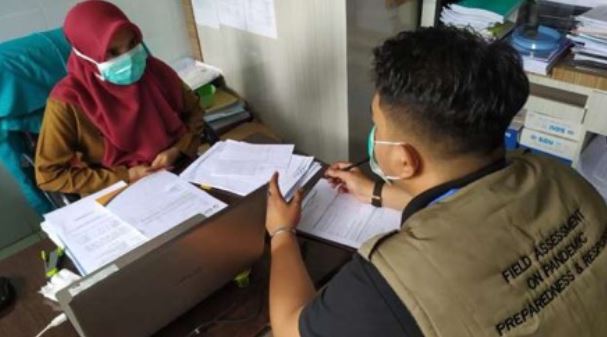
Director of Direct Transmitted Diseases Control - MoH presented the objectives of the field assessment for COVID-19 pandemic preparedness, 7 July 2020. Photo credit: Endang Wulandari/ WHO
WHO, in collaboration with University of Hasanuddin and National Board for Disaster Management (BNPB), supported the Ministry of Health (MoH) to conduct field assessments in 211 locations across Indonesia from 4 September to 9 October 2020. The activities aimed to assess COVID-19 preparedness in fifteen provinces, based on the status of their pandemic risk: Bali, Bangka Belitung Island, Central Java, Central Kalimantan, Central Sulawesi, DKI Jakarta, East Java, East Nusa Tenggara, Maluku, North Sumatera, Papua, Riau, Riau Island, South Sulawesi, and West Kalimantan.

A field enumerator (volunteer) assigned by BNPB conducts an interview using the field assessment tool in Tanjung Pinang District Health Office, Riau Island. Photo credit: xx
About ten participants from WHO, MoH and University of Hasanudin Makasar developed assessment questionnaires which were then tested in nine provinces. Field enumerators assigned by the BNPB underwent a training followed by field assessment, data collection and analysis.
The assessment covered provincial command centres, provincial health offices, port health offices, hospitals, laboratories, district health offices, public health centres, and community health centres.
Results and conclusions
All assessed provinces had a functioning command and control structure for pandemic management; however, not all of them established Emergency Operations Centres (EOC). Contingency plans for pandemic response were in place in several locations, but there remains a need for joint Contingency Plans with neighbouring countries.
Key areas of improvements were case reporting and analysis for pandemic severity, budget allocation for response in points of entry, personal protective equipment stockpiling and exit screening of passengers. The assessment further identified health systems gaps in provinces, such as availability of ICU and other facilities in the event of rising COVID-19 cases. Health systems need to be strengthened, especially for district-level hospitals.
Laboratories for COVID-19 testing are facing challenges, such as backlog of specimens tested and low level of testing referral among laboratories. One of the solutions is to develop a laboratory referral system to avoid specimen accumulations. Meanwhile, the biggest gaps in the surveillance system in all provinces were the low level of isolation of suspected cases and the challenge to confirm COVID-19 status within 48 hours. Contact tracing, contact quarantine and case isolation need to be strengthened.
Communities need to be empowered during pandemic preparedness and response. Risk communication systems can be developed by including risk assessment as part of coordination efforts, monitoring infodemic and enlisting media channels and/or community organizations for dissemination of accurate and valid information on COVID-19.
The assessment further showed varied perceptions about health protocol implementations. Provincial Health Offices, District Health Offices, and puskesmas (primary healthcare centre) believed that the community did not sufficiently comply with health protocols. Field assessment at community level, however, showed that respondents displayed high compliance with health protocols; the use of face masks being the most popular. These findings need to be considered in disseminating health messages to the community to promote health protocols.
During the assessment period, almost all provinces reported an increasing number of confirmed cases and deaths. Therefore, pandemic preparedness and response need to be strengthened.
Way forward
The results of the field assessment will be used to inform key stakeholders of the strengths and gaps in each province in responding to the ongoing COVID-19 pandemic. Moreover, they will be useful in preparing the country for future outbreaks. WHO stands ready to provide support to the MoH in conducting regular field assessments to help ameliorate public health emergency preparedness at national and sub-national levels.
